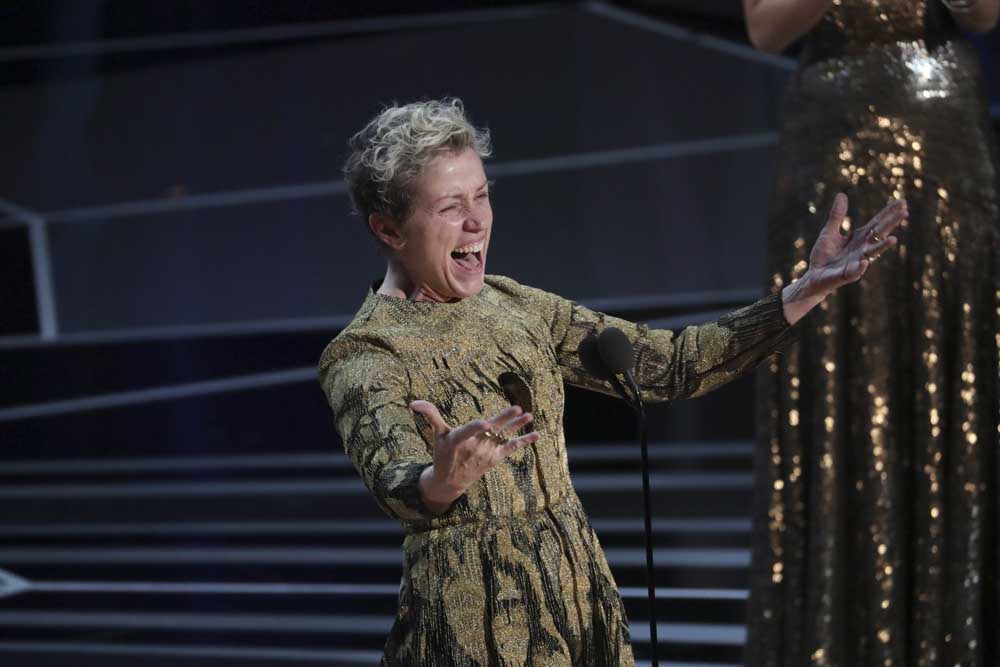‘Shape of Water’ claims top prize at Oscars
Published 12:00 am Monday, March 5, 2018

- Frances McDormand accepts the Oscar for best actress in a leading role for “Three Billboards Outside Ebbing, Missouri” during the 90th Academy Awards at the Dolby Theater in Los Angeles on Sunday. McDormand asked every female nominee in the room to stand with her.(Patrick T. Fallon/The New York Times)
LOS ANGELES — The first Oscars of Hollywood’s post-Harvey Weinstein era took care of its serious business at the start. As the 90th Academy Awards got underway Sunday night, host Jimmy Kimmel addressed the sexual harassment scandals that have rocked Hollywood.
“And that’s the kind of men we need more of in this town,” Kimmel said, pointing to a colossal Oscar statue on the stage, noting that the figure “keeps his hands where you can see them” and has “no penis at all.”
Trending
He then grew serious and noted the #MeToo and Time’s Up movements that started in Hollywood after the Weinstein revelations and have reverberated across the globe, challenging the entertainment industry to make good on its promise to reform itself. “The world is watching us,” he said. “We need to set an example.”
With that, the ceremony swerved into its usual piquancy, lightly teasing nominees like Meryl Streep, up for her 21st Oscar, and handing out awards fairly evenly to a number of nominated films.
“The Shape of Water,” Guillermo del Toro’s fable starring Sally Hawkins as a mute cleaning woman who falls for a merman held in a government lab, claimed the top prizes. It won best picture and earned del Toro the Oscar for best director. It also won for production design and best score. The film had entered the night with 13 nominations.
“I am an immigrant,” an emotional del Toro started his acceptance speech for the director prize by saying, continuing to note that art has the power to “erase the lines in the sand” between people of different ethnicities. “We should continue doing that when the world tells us to make them deeper.”
Jordan Peele, who wrote and directed “Get Out,” a horror movie centered on racism in the liberal white suburbs, was honored for his original screenplay. Peele received a raucous standing ovation, indicating the Hollywood establishment’s respect for his movie and also his arrival as a certified member of that elite group. He thanked his mother, who, he said, “Taught me to love even in the face of hate.”
Four-time nominee James Ivory, 89, won his first Oscar, for his adapted screenplay for the gay romance “Call Me by Your Name.” All people, “whether straight or gay or somewhere in between,” can understand the emotions of a first love, Ivory said, reading from notes. (Ivory was previously nominated for directing “A Room With a View,” “Howards End” and “The Remains of the Day.”)
Trending
There were no surprises in the top acting categories. Gary Oldman, who transformed himself into a gurgly Winston Churchill in “Darkest Hour,” won best actor. He thanked his mother, telling her: “Put the kettle on. I’m bringing Oscar home.”
Frances McDormand won her second Academy Award for best actress, this time for playing an extremely fed-up mother in the divisive “Three Billboards Outside Ebbing, Missouri.” She was honored in 1996 for her you-betcha performance in “Fargo.” McDormand placed her Oscar on the stage and asked every female nominee at the ceremony to stand and be recognized.
Sam Rockwell won the best supporting actor for his performance as a racist dimwit of a police officer in “Three Billboards.” And Allison Janney won the supporting actress Oscar for her performance as Tonya Harding’s hard-bitten mother from hell in “I, Tonya.”
Rarely had more pressure been placed on an Oscar telecast. The Academy of Motion Picture Arts and Sciences had the burden of trying to keep ratings from falling, while celebrating films that, for the most part, have not been widely seen. The ceremony, broadcast on ABC, took time to acknowledge the sexual harassment scandals that have engulfed Hollywood in recent months while also gazing lovingly at the history of moviemaking to mark Oscar’s 90th birthday.
Several women deeply involved with the Time’s Up anti-sexual-harassment initiative, including Ava DuVernay and Shonda Rhimes, said they were not planning any red-carpet stunts. In the two months since Time’s Up officially began, the group has amassed $21 million for its legal defense fund and, said Tina Tchen, a lawyer leading that initiative, has fielded 1,700 requests for assistance from landscapers, government workers, police officers, prison guards, and hotel and catering workers. (Some 1,250 have been connected with lawyers.)
Still, at least one “moment” had been planned for the show. Three accusers of Weinstein — Ashley Judd, Annabella Sciorra and Salma Hayek — took the stage together. They spoke about change in the industry and efforts to embrace equality and diversity.
In another example of the #MeToo effect, Casey Affleck, last year’s best actor winner, was notably absent from the proceedings. He backed out after the clamor about two sexual harassment claims he had settled years ago grew too loud: Jennifer Lawrence and Jodie Foster presented the best actress Oscar in his stead.
“Phantom Thread,” Paul Thomas Anderson’s period romance about an obsessive dressmaker, won for costume design. Best hairstyling and makeup went to the World War II drama “Darkest Hour.” “Dunkirk,” Christopher Nolan’s layered war epic, collected Oscars for sound mixing, sound editing and film editing.
Kobe Bryant became an Oscar winner: “Dear Basketball,” which Bryant made with former Disney animator Glen Keane, overcame questions about Bryant’s past to win the trophy for best animated short — as some members of the audience exchanged incredulous looks. #MeToo activists had said a 2003 sexual-assault case against Bryant was reason not to reward the movie. (The case was dismissed.)
“As basketball players, we’re supposed to shut up and dribble,” Bryant said in an apparent reference to Fox News host Laura Ingraham’s recent criticism of LeBron James for speaking out against President Donald Trump. Bryant went on to thank his wife and daughters.
Pixar continued its Oscars hot streak, with its “Coco” named best animated feature, Disney’s sixth straight victory in the category. “Representation matters!” shouted its co-director Lee Unkrich, a reference to the film’s characters and storyline, which centered on Mexico’s Day of the Dead celebration.
“A Fantastic Woman,” from Chile, was named best foreign film. Rita Moreno, who won a supporting actress Oscar in 1962 for “West Side Story,” presented the prize. In keeping with the telecast’s theme of looking back at celebrated performances, a clip highlighted Moreno’s performance in “West Side Story.”
In a surprise, the Oscar for best documentary went to “Icarus,” a Netflix film about systematic Russian doping at the Olympics. (Russia was banned from the recent Pyeongchang Games, though some of its athletes were still allowed to compete.) It was Netflix’s first Oscar for a feature film, having won last year’s prize for best documentary short, for “White Helmets.”








